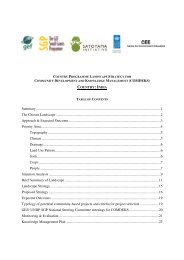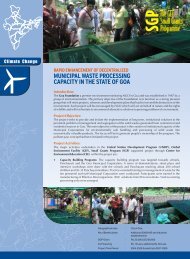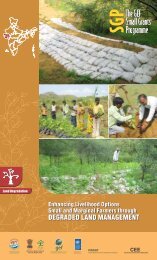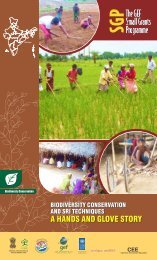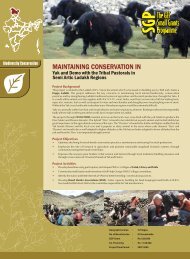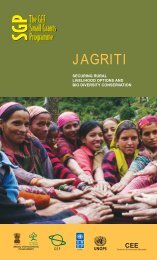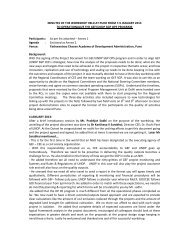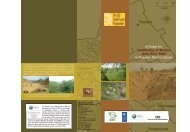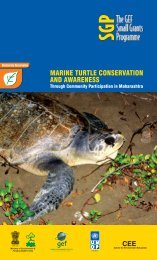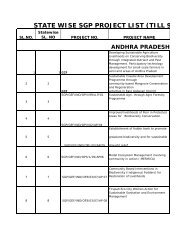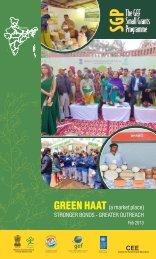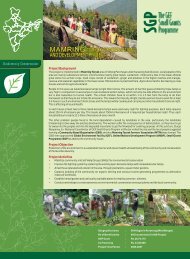Sanio ka Sangathan
Sanio ka Sangathan - SGP India
Sanio ka Sangathan - SGP India
You also want an ePaper? Increase the reach of your titles
YUMPU automatically turns print PDFs into web optimized ePapers that Google loves.
<strong>Sanio</strong> <strong>ka</strong><br />
<strong>Sangathan</strong><br />
RINGAL<br />
CONSERVATION<br />
AND LIVELIHOODS PROJECT<br />
SUSTAINABLE MANAGEMENT<br />
OF NATURAL RESOURCES<br />
tgk¡ gS gfj;kyhA<br />
lR;eso t;rs ogk¡ gS [kq’kgkyhAA<br />
Ministry of Environment &<br />
Forests (MoEF)<br />
U N<br />
D P<br />
CEE<br />
GEF India UNOPS<br />
Centre for Environment Education
<strong>Sanio</strong> <strong>ka</strong> <strong>Sangathan</strong> (SKS) is a voluntary organization<br />
established in 1996. Since its establishment, the SKS has focused<br />
in creating better opportunities for Dalits & Women. Presently<br />
organization is working on women development and Natural<br />
Resource Management (NRM) issues among 8 development<br />
blocks of districts Nainital, Almora, Bageshwer and<br />
Pithoragarh of Uttarakhand.<br />
<strong>Sanio</strong> <strong>ka</strong> <strong>Sangathan</strong> (SKS) has organized women into Self Help<br />
Groups (SHGs) during last 12 years in rural areas of Uttarakhand<br />
State, SKS is successfully mobilizing SHGs into informal forums for<br />
empowerment and better livelihoods. SKS has also organized<br />
camps on Women Violence, through the groups, diagnose root<br />
causes for lack of space for women in society and find ways to<br />
address them. Women are getting space, freedom to express and<br />
skills through continued dialogues and one to one meetings.<br />
Under its health programs, SKS trained Dai (nursing women) who<br />
are handling much better in their neighborhood villages in delivery<br />
cases.<br />
Skills of girl/adolescents are strengthening through library<br />
programs, tailoring and allied activities and adolescent health<br />
programs for better quality of life.<br />
SKS organized Ringal (a variety of bamboo) workers and stressed<br />
the local governments to reopen their Ringal permits, so as to<br />
manage their natural ringal resources. In agro-pastoral villages,<br />
seed bank program have been operated by SKS. Compost<br />
formation, Rain Water Harvesting tanks, Ringal/Lantana trainings,<br />
plantations, wasteland development are still going on in working<br />
villages. SKS has focused on the community mode of working,<br />
capacity enhancement and decision making among males &<br />
females in villages.<br />
SKS has completed a detailed study on Van Panchayat (VP) system<br />
of Uttarakhand. Since last 5 years, the issue has become a state<br />
level concern for government. SKS is regularly analyzing the VP<br />
Rules with Sarpanch (head of VP), providing trainings on<br />
management of VP and betterment of forest resources.<br />
SKS organized<br />
women as SHGs<br />
during last 12<br />
years in rural<br />
areas of<br />
Uttarakhand<br />
State. Where SKS<br />
is operating the<br />
groups, are<br />
learning from<br />
each other;<br />
mutual trust and<br />
exchange visits<br />
are impacting<br />
livelihoods. SKS<br />
has also<br />
organized camps<br />
on women<br />
violence.
RINGAL<br />
REGENERATION<br />
PROJECT<br />
Ringal (a variety of<br />
bamboo i.e.,<br />
Dendrocalamus spp.)<br />
is a prominent source<br />
of livelihood for the<br />
poor and<br />
marginalized in Baidi<br />
and Rudi villages, but<br />
government banned<br />
ringal consumption<br />
in 1983, and<br />
cancelled all the<br />
permits. As a result,<br />
this community<br />
became helpless and<br />
Ringal<br />
Entrepreneurship<br />
was about to vanish,<br />
till SKS addressed<br />
these issues...<br />
SKS inter face for Ringal Regeneration & Conservation<br />
Facilitate Permit Reopenings<br />
Organization of Ringal Workers was formed and forced<br />
government to reopen the permits for villagers.<br />
Link to Markets<br />
Trainings enhanced capacity for ringal workers. Development of<br />
variety of items, gifts etc, opened new scope of markets for them.<br />
Enhance Raw Material<br />
Lack of raw material (ringal) compensated by plantation of ringal<br />
in nearby villages and local forests.<br />
Empowerment of Women<br />
Traditionally women were out of ringal work but after various<br />
trainings and meetings, men understood the importance women<br />
play and now jointly work together.<br />
Alternate to Ringal<br />
Lack of ringal and distance from forest creates hindrances for<br />
people. SKS suggested Lantana as alternative for ringal as per<br />
market demand.
During first project, village meeting; use of participatory rural<br />
appraisals led to form Parayavaran SHGs. Micro-credit started in<br />
20 villages. This led to easy and cheap access to credit at source.<br />
ACHIEVEMENTS<br />
• Persistent efforts of the<br />
communities (Ringal<br />
Organization), Government<br />
reopens restrictions and<br />
permits for ringal use.<br />
• Agri-tools, fancy items from<br />
ringal linked to markets in<br />
local haats/fairs/occasions.<br />
• Plantations save time and<br />
people get raw material in<br />
near by villages.<br />
• Women engaged in ringal<br />
work, getting income from it,<br />
enhanced economic status<br />
and skills for better results.<br />
• Lantana furniture, items,<br />
book racks etc. new items<br />
developed.<br />
SKS started the first project in 6 villages with assistance of<br />
Paryavaran Sikshan Kendra (PSK) and Global Environment Facility<br />
(GEF) United Nations Development Program (UNDP) Small Grants<br />
Program (SGP) in 2003. Following interventions were made in the<br />
project from 2005-06:<br />
Agro-Pastoral Concerns<br />
With involvement of women, 20 Eco-development Committees<br />
were formed in villages. 5 Seed banks formed other activities<br />
conducted by locals through informal institutions.<br />
Avoid seed brokers, use of local seeds promoted and cash payment<br />
system for seed evolved. Educational tours, bio-manure and<br />
polyhouses constructed with women especially.<br />
Fodder problem addressed, nearby land protected and fodder<br />
species planted. This developed about 20 acres of wasteland to<br />
grazing land.<br />
Water Concerns<br />
To mitigate water problem, 45 small irrigation systems and rain<br />
water harvesting tanks were constructed.<br />
Reconstruction and cleaning of 15 traditional waterbodies, layout<br />
of pipe lines took place in villages.<br />
To revive traditional water conservation methods, water<br />
campaigns (JAL YATRA) was organized in villages with Mr.<br />
Rajendra Singh of Rajasthan. This led to building mutual trust as<br />
results were seen by locals.<br />
Gender Concerns<br />
Micro-credits through SHG, Banks lin<strong>ka</strong>ges established. IGPs<br />
started like goat/buffalo husbandry, vegetable production etc in 5<br />
villages. More than Rs. 100,000 loans have been accessed in SHGs.<br />
All SHGs have bank accounts.<br />
Lantana trainings for furniture and other fancy items.<br />
Awareness about violence on women resulted in cluster level<br />
resolutions. Many women were saved in villages from male<br />
dominance and society neglect.<br />
Ecological Concerns<br />
Organizing camps, seminars, tours and competitions on<br />
environmental issues with school children, led to build sensitivity<br />
in the locals to address their concerns.
ACHIEVEMENTS OF PROJECT<br />
• The project was scaled from 5 villages to 50 villages to<br />
have a widespread impact.<br />
• In the scaled up project nearly 37 SHGs have been<br />
formed and nearly Rs. 3000 savings take place monthly<br />
in all SHGs.<br />
• Seed banks developed and people encouraged for use<br />
of local seeds. Easy availability and low cost methods<br />
are encouraged.<br />
• People have accepted traditional water use and<br />
enhanced production of potato and pea yield by rain<br />
water harvesting tanks.<br />
• Wasteland development provided additional livelihood<br />
benefits and regenerated new land areas.<br />
• Through Income Generation Programs (IGP), economic<br />
status raised and better livelihoods process started.<br />
Women's identity and social status increased.<br />
• Continuous inter face against violence on women.<br />
Mainstreaming gender concerns into a male dominated<br />
society has given local women better space to express<br />
their rights.<br />
75<br />
70<br />
Progress of Field Area<br />
• Organizational capacity and unity among women<br />
increased. Local capacities of NGO enhanced in a wide<br />
range of issues.<br />
With continuous support and involvement of people, SKS<br />
extended its first project with GEF UNDP SGP. Currently this<br />
project has expanded in 70 villages of 5 blocks in district<br />
Nainital. New ideas added i.e rain water harvesting, bio-gas<br />
plants, technical trainings etc. In all activities the<br />
communities are sharing costs (10.25%); taking joint<br />
decisions and agreeing norms and modalities for<br />
developing sustainable approaches.<br />
Year Village<br />
30<br />
28<br />
23<br />
20<br />
15<br />
10<br />
8<br />
4<br />
1999<br />
2000<br />
2001<br />
2002<br />
2003<br />
2004<br />
2005<br />
2006<br />
2007<br />
2008
S.No. Activities No. of No. of Families Impacts<br />
Villages Benefitted<br />
1. Entry into 34 937 Most of the Villages in<br />
Villages<br />
Nainital District<br />
2. Denotification of Ringal 10 128 15 Acre Land<br />
both for Food & Plant<br />
3. Lantana Trainings 7 185 5 Women recognized as<br />
members<br />
4. Self Help Group savings 37 2130 Rs. 465,000<br />
in villages<br />
5. No. of SHGs 53 1440 Income generating program<br />
6. Bank Loans 7 107 Rs. 226,250<br />
7. Seed Banks 7 90 Saving Rs. 93,000<br />
in Village Seed Bank<br />
8. Waste land Development 7 102 20 Acre Land developed<br />
9. Rain Water Tanks 11 43 43 Tanks developed<br />
10. Jal Yatra 6 490 30 Village Awareness Created<br />
11. Environmental Schools 350 Camp; Exhibitions 2<br />
Awareness with in Tours; Competitions<br />
school children Villages<br />
12. Bio Gas Plants 5 15 15 Plants Developed<br />
13. Trainings in 51 165 Waste Land Development;<br />
villages<br />
SHGs; Compost Making;<br />
Bio Gas; Forest Land<br />
Rights.<br />
SKS<br />
<strong>Sanio</strong> <strong>ka</strong> <strong>Sangathan</strong><br />
Village- Nagarigaon, Post- Bhowali,<br />
Nainital, Uttarakhand<br />
PIN - 263 132<br />
Ph.: 05942 - 220714<br />
vanpanchayat@rediffmail.com<br />
sksbhowali1@yahoo.co.in<br />
National Co-ordinator<br />
GEF UNDP Small Grant Programe<br />
CEE Delhi,<br />
C-40 South Extension-II,<br />
New Delhi-110049<br />
E-mail: sgpdelhi@ceeindia.org<br />
www.sgpindia.org<br />
www.ceeindia.org<br />
CEE North<br />
Co-ordinator/Office-in-charge,<br />
Centre for Environment Education<br />
19/323, Indira Nagar, Lucknow,<br />
U.P. - 226 016. Tel.: 0522-2716570<br />
Fax : 0522-2716628<br />
E-mail : ceenorth@ceeindia.org<br />
sgpnorth@ceeindia.org<br />
(For Uttar Pradesh, Bihar, Uttaranchal)



